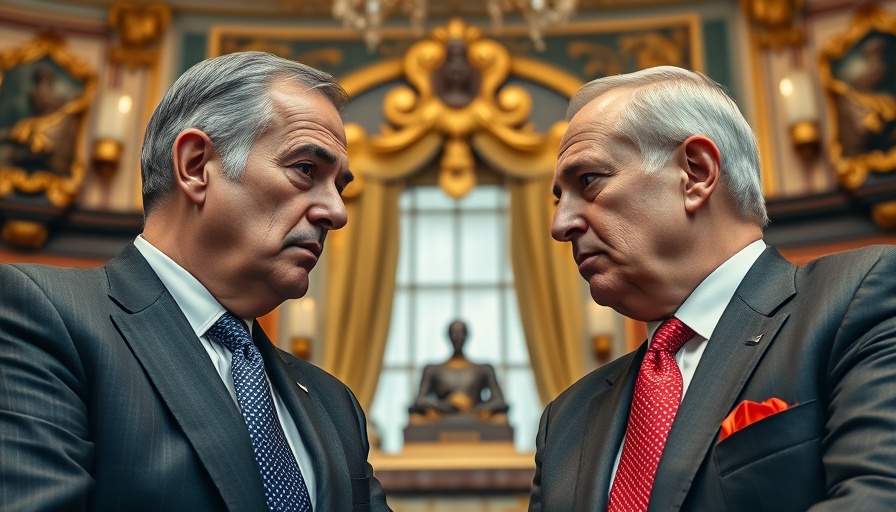
Trump's Influence on Ukraine Policy: A Shifting Landscape
As Europe watches anxiously, the specter of Donald Trump’s potential return to the White House raises significant concerns about the future of U.S. support for Ukraine. With the ongoing conflict in Ukraine showing no signs of abating, the prospect of Trump stepping back from negotiations has made European leaders uneasy. Historically, U.S. backing has been crucial for Ukraine, not only in terms of military aid but also in diplomatic support. If Trump's plans materialize, it could transform the approaches between NATO allies and the conflict-stricken nation.
The Current Geopolitical Climate and Its Implications
In the current geopolitical climate, where strategic alliances are paramount, the uncertainty surrounding U.S. foreign policy has already raised many questions. Analysts argue that Trump’s non-traditional stance on international relations, having previously voiced skepticism about NATO, could lead to a more isolationist U.S. policy. This change would likely leave European nations to propel the support for Ukraine on their own, heightening fears of a divided West.
Potential Impacts on Defense Spending in Europe
Should Trump prioritize domestic issues over foreign affairs, European countries may need to increase defense spending to compensate for a weakened U.S. presence. The debate about defense budgets is already swirling, especially in nations like Germany and France, which have been criticized for not meeting NATO's recommended spending guidelines of 2% of GDP. Consequently, a shift in U.S. policy could reverberate through European defense strategies, pushing nations to reconsider their military engagements.
Political Reactions Across Europe
European leaders have begun to express their concerns publicly. Certain officials warn that if Trump persists in adopting an America-first policy, it may embolden adversaries like Russia. German Chancellor Olaf Scholz has emphasized the importance of continued support for Ukraine not just as a response to aggression, but as a reaffirmation of European unity. This unity is crucial as U.S. support is perceived as a stabilizing factor that strengthens Europe’s position on the world stage.
Public Sentiment on Trump’s Presidency and Global Diplomacy
Public sentiment towards Trump varies widely across Europe. In some countries, nostalgia for the past manifests as a desire for Trump’s more hawkish engagements during his presidency, while others remain suspicious of his approach to alliances. Understanding the nuances of public opinion offers insights into how various governments might react—a reflection of each country's distinct political landscape.
Future Predictions: A Europe Without a Firm U.S. Ally?
Looking ahead, the potential for Trump’s return raises several concerns about international alliances. Should he pivot away from supporting Ukraine, it could usher in a new era of political isolation for the U.S. on the global front. Alternatively, it could spark a deeper commitment among European nations to collaborate more closely on matters of security and diplomacy, perhaps signaling a shift in the global order.
What This Means for the Bay Area and Tech Entrepreneurs
For those in the Bay Area business ecosystem, particularly among startups and tech entrepreneurs, the political landscape is pivotal. Companies focusing on defense technologies or seeking government contracts may find opportunities or barriers depending on U.S. foreign policy. As venture capital funding in sectors like cybersecurity or international relations grows, understanding global cues can guide local entrepreneurs in aligning their strategies. Hence, keeping abreast of geopolitical developments can be as essential as market trends and innovation for the entrepreneurial spirit in Silicon Valley.
The Role of Corporate Responsibility in Turbulent Times
In times of global uncertainty, corporate responsibility becomes even more significant. Companies are under increasing pressure to navigate their actions within the broader context of social good and ethical governance. Firms that take a stand on issues such as international aid or humanitarian efforts can enhance their reputation, thereby aligning their corporate goals with the values of socially conscious consumers. This suggests that the impact of international policy extends beyond politics—shaping corporate cultures and business practices as well.
This complex interplay of politics and business sets the stage for an uncertain future, particularly for entrepreneurs in the Bay Area seeking to position themselves in a rapidly changing global economy.
In this evolving scenario, it’s imperative for local businesses and startups to remain agile and informed, ensuring their growth strategies are adaptable to external shifts in policy and public sentiment. The growing importance of strategic insight into international relations may serve as a gateway for innovative partnerships and avenues for sustainable growth as the political landscape continues to shift.
 Add Row
Add Row  Add
Add 



Write A Comment